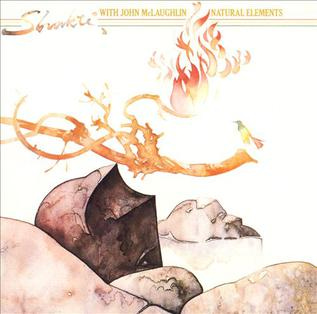How 1977 Indo-Jazz fuels reflection -AI Image by Author (Microsoft Designer)
Hi, all! I'm writing this while sitting in my comfy chair. My record player is spinning a gem I found a few days ago: the vinyl of "Natural Elements" by Shakti with John McLaughlin. What a find! I got it in a cute little shop in old Naples for just 5 euros!
As the needle moves, the room fills with sounds that take me on a great sound trip. This album mixes Indian and jazz music well. It's like East magically meets West. John McLaughlin's electric guitar weaves with L. Shankar's violin. They make tunes that seem to dance in the air. Zakir Hussain's beats swirl like a wind of energy. It makes me want to move in my seat. Then there's T.H. "Vikku" Vinayakram with his clay pot drum. He adds a special beat, like the earth is singing.
Natural Elements - 1977 - CBS Records.
1977
This record came out on October 24, 1977. That was 47 years ago! It makes me think about how much the world has changed. As I listen, I think about how we humans deal with tech today, especially AI.
There's this thing called the Dunning-Kruger effect. It's interesting. It's like when I was a kid and learned two guitar chords. I thought I could play like a pro! That's what this effect is. People who don't know much think they're great. Experts often think they're not that good. With AI in our lives now, this gets even more interesting!
I laugh when I think of how smart I felt using a translation app. Then I'd talk to a native speaker and mess up big time. But I'm not alone, right? It's easy to think we're as smart as these clever machines. Even when we don't know how they work at all.
Vedanta
As I hear McLaughlin and Shankar play together, with Hussain and Vinayakram's beats, I think we can learn from Indian ideas. Some cool concepts in Advaita Vedanta might help us. Let me explain what these Sanskrit words mean:
1. Viveka (discernment): means "telling things apart."
2. Vairagya (detachment): means "not being too attached."
3. Sannyasa (renunciation): means "giving up," especially actions driven by want.
4. Tyaga (renunciation): means "letting go," especially of the results of what we do.
AI
Now, let's see how these ideas can help us with AI:
1. Viveka: It's like hearing each part in a song. With AI, it means knowing what we can do and what machines can do. We shouldn't get too excited or too down.
2. Vairagya: Think of hearing a great violin solo. Instead of feeling bad that you can't play like that, just enjoy it. We can learn to use AI to get better, not to compete with it.
3. Sannyasa: This means not doing things just because we want something. It's like playing music just for fun, not to be the best. With AI, we should see each use as a chance to grow, not worry about being the best.
4. Tyaga: This is about not getting hung up on results. Think how this music mixes cultures without saying one is better. We can use AI to do good things, not just to look smart.
As the album ends, all the sounds seem to join as one. I realize we shouldn't try to beat AI. We should find our beat, like these great musicians. What makes us human - our ideas, our feelings, how we connect - are things no machine can truly copy.
Focus
In this AI age, I think we need to focus on:
1. Always Learning: Like a musician who keeps practising, we need to keep learning about AI. This helps us understand things better.
2. People Skills: Machines can do a lot, but they can't feel or create like us. Let's work on these skills, just like these musicians work on their music.
3. Working with Machines: Think if these musicians played against each other, not together. It wouldn't sound as good. We need to work with AI, not against it.
And…so?
As the record stops, I feel richer. Not just from the great music, but from the thoughts it gave me. What about you? How do you feel about AI? Have you ever thought you were better with tech than you were?
Remember: It's not about being the best. It's about learning and growing. Like this old record that still teaches me new things every time I listen!
P.S. If you can, listen to Shakti's "Natural Elements." The mix of sounds by McLaughlin, Shankar, Hussain, and Vinayakram will make you think in new ways!
Feel free to leave a comment.
I have woven tales for anyone who cares to read them. My books await you on Google Books. Check also my stories on Medium.com.
I am eager to participate in research and produce content on Cross-Cultural Philosophy. Considering the many philosophy professors following Learn Vedanta Substack from universities across the five continents, I would be truly honoured to be involved in projects, as I have been recently approached. Please feel free to contact me.
I would be honoured if you considered subscribing to the Premium Contents of my Vedanta Substack and leaving feedback, comments, and suggestions on this page and by writing to me at cosmicdancerpodcast@gmail.com.
Visit my BuyMeACoffee page.
Thanks for reading.





